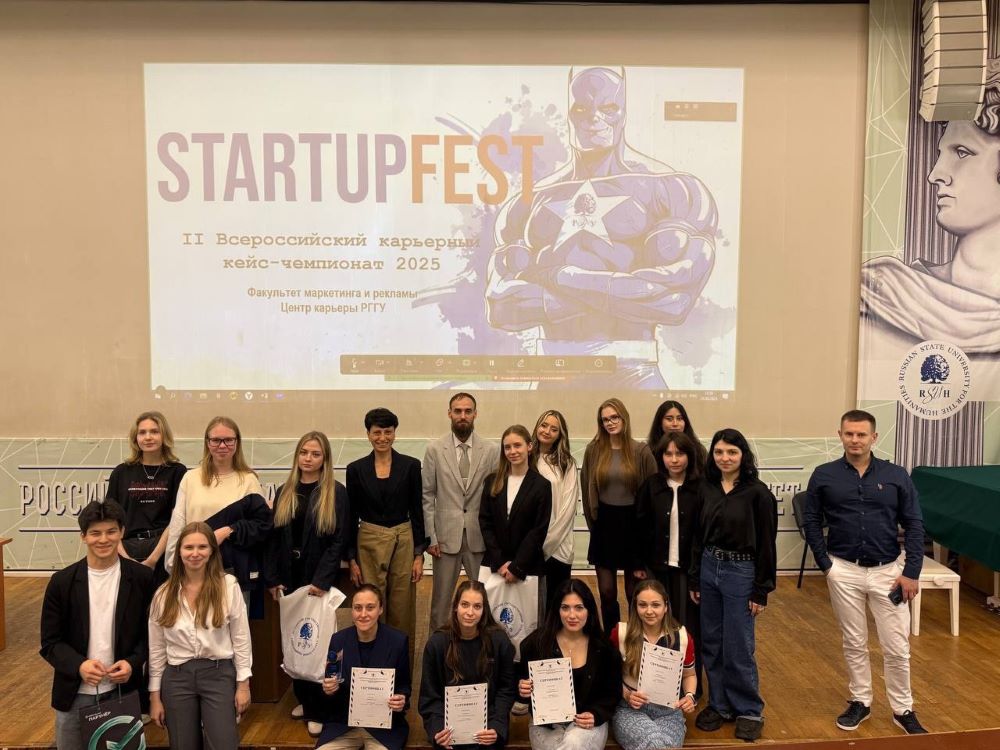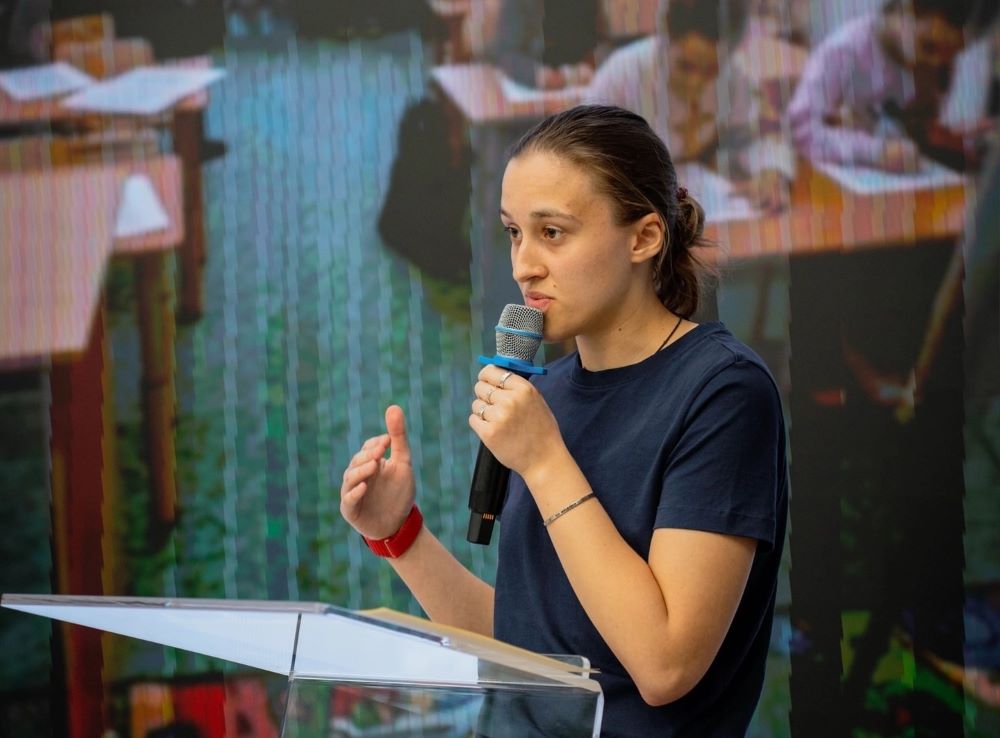Color against inattention – how students and teachers at RUDN University and Altai State University created an app for children with ADHD

This year, the ActiMinds project team presented its application at the RUDN.VC 2.0 accelerator, becoming a finalist and receiving investor support. The development then won the Startup Fest 2025 competition organized by the Russian State University for the Humanities.
Project team:
- Saniya Islamova – Project Manager, Analyst-Programmer, First-year Master’s student in Applied Informatics at the Faculty of Science, RUDN University.
- Mikhail Yatsenko – Research Supervisor, Candidate of Biological Sciences, Psychophysiologist, Associate Professor at the Department of General and Applied Psychology, Altai State University.
- Tatyana Ustimenko – Director of Cognitivica Center.
- Ivan Brak – Scientific Communication Specialist, Candidate of Biological Sciences, Neurobiologist, Senior Lecturer at the Faculty of Science, RUDN University.
- Doruk Merich – Programmer, First-year Master’s Student in Applied Informatics at the Faculty of Science, RUDN University.
Development idea
The color photostimulation method involves exposing the body to light signals of different colors – red, blue, green (chosen by the app user) – at an optimal flashing frequency.
Photostimulation helps to rebuild the functional state of the cerebral cortex to an optimal mode of operation and activates Brodmann area 10, which in turn activates the prefrontal cortex of the brain. It is the prefrontal cortex that is involved in cognitive functions such as planning, decision-making, awareness, and establishing logical connections between phenomena and theoretical propositions, as well as in retrieving memories from episodic memory.
The mobile app developed by the team works in conjunction with VR glasses. The user puts on the glasses, turns on the app, and selects a color that will affect them for 2-10 minutes (red, blue, or green). Then they simply watch the flashes, which appear in the shape of a circle in the selected color.
What are the advantages of this development:
- low cost of 2,500 rubles for a course of therapy consisting of 10 sessions (traditional methods of therapy cost between 20,000 and 50,000 rubles);
- easy to use with minimal equipment (a smartphone with the app installed plus VR glasses);
- the effect is noticeable from the very first session;
- high safety in the absence of epilepsy, heart disease, recent retinal detachment, or recent eye surgery;
- statistics and session history are available, and options are planned to be expanded;
- communication with the project team is available via chatbot and a VK channel.
The project idea originated at Altai State University in 2001 during research of the influence of brain activation levels on mental performance efficiency.
The project was initiated by Professor Vladimir K. Kharlamov, who together with his colleagues conducted a series of studies on the relationship between brain activation levels and mental performance efficiency.
“University scientists found that at a certain level of brain activation, the participants in the experiment showed high levels of mental performance. This led to the idea of “imposing” this activity on the brain to improve its performance using color photostimulation. During the research, ordinary glasses with black opaque lenses were used, with three LEDs – red, green, and blue – glued to the inside of the lenses in the center. The glasses were connected by a wire to a special unit with a liquid crystal display. It allowed changing the frequency of flashes, brightness, and color,” Saniya Islamova, head of the ActiMinds project and a master's student at RUDN University (Applied Informatics, 1st year).
Team expansion
Saniya Islamova joined the project in September 2024 as an administrator and soon became its head. When programmer Merich Doruk joined the team in early 2025, an opportunity arose to modernize the application. In two months, Merich created a new version of the service from scratch, which was deployed on PythonAnyWhere hosting. The team is now transitioning to Express.js (backend) and Next.js (frontend) frameworks in JavaScript and the PostgreSQL database management system to be able to block content to protect against piracy and plagiarism. In addition, unnecessary settings were removed from the service, but an algorithm for creating a personal account and verifying users with a unique token was added.
Investor selection
With the upgraded application, the team participated in the RUDN.VC 2.0 accelerator. The program lasted 70 days. Sania and her colleagues held more than 130 meetings with mentors and trackers, attended eight open lectures by market experts, and improved their project. On May 30, at the demo day, Sania defended the team’s work in front of investors. One of them, Ivan Shumilov, founder of ABV and ambassador of the Academy of Innovators, selected ActiMinds for further cooperation. Here is how he assessed the project.
“The development has potential. It is possible to quickly monetize it through a combination of technology and service. However, more measurements on people are needed to demonstrate the results – before and after. To increase trust among parents, specialists, and partners, it is necessary to strengthen the scientific and expert base. Bringing people with relevant education, publications, clinical and research experience into the team or expert council will be a strong support. Their conclusions will be able to reinforce the evidence base of the method. The app can also be adapted to other problems, not only ADHD, but also stress, anxiety, and difficulty adapting. This will expand the product line,” Ivan Shumilov, founder of ABV and ambassador of the Academy of Innovators.
Best Startup
After completing the accelerator program, the ActiMinds team formulated a commercial proposal for cooperation with private psychologists and neuropsychologists, psychological centers, and also agreed with the departments of Psychology at RUDN University to collaborate starting in the fall of 2025. With these results, the ActiMinds project participants submitted an application for the Startup Fest 2025 competition organized by the Russian State University for the Humanities.
“At first, we didn’t have high hopes for winning, as we had to create a project website and organize a marketing campaign. Setting up online advertising was probably the most difficult part, as we did it for the first time. After that, we recorded a video about ActiMinds, the marketing campaign, and its results, and submitted our application for the competition. The jury watched the video, and in the end, the student organizers from RSUH wrote to us and invited us to the awards ceremony in one of the categories. And it turned out to be a victory in the main category. The victory was a clear affirmation of our project and teamwork – proof that our efforts weren’t in vain!” – Saniya Islamova, head of the ActiMinds project and master's student at RUDN University (Applied Informatics, 1st year).
According to Sania, the recommendations for further development of the project from the organizers and jury of the competition were very valuable. Mikhail Boldyrev, Director of the Center for Project Activities and Communication Technologies at Russian State University for the Humanities, advised the team to create a website and social media accounts for the project.
New goals
The team has taken the expert’s advice on board, so its immediate plans include creating social media accounts and a project website to educate and raise awareness among parents about ADHD and their method. They also plan to collaborate with the psychology departments of RUDN University and Moscow State University on research and scientific articles in the new academic year, and to establish commercial partnerships with private neuropsychologists and psychological centers.
“We also plan to launch our own mobile app for the Android platform, which will work in conjunction with VR glasses. In addition to the main function based on the photostimulation method, the service will offer psychological tests, analysis of the user’s speech segment before and after applying the color photostimulation method, support, and online consultation with a professional psychologist. It is planned to make the app available on all accessible marketplaces,” Saniya Islamova, head of the ActiMinds project and a master’s student at RUDN University (Applied Informatics, 1st year).
In addition, the ActiMinds team wants to apply for the Student Startup competition organized by the Social Initiatives Fund and compete for a grant. They hope for another victory.

RUDN University summed up the results of the competition among scientific student societies and scientific circles. The GreenLab of the Institute of Ecology became the best Student Research Society, the second place was taken by the Institute of Foreign Languages, and the third place - the Faculty of Humanities and Social Sciences.
Student science and popularization tour club has been operating at the Institute of Environmental Engineering for five years now. It was established under the auspices of the GreenLab Student Scientific Society.
RUDN University summed up the results of the I International Student Competition in memory of Professor Pyotr Kucherenko. More than 100 applications were submitted from students of the Law Institute.
RUDN University summed up the results of the competition among scientific student societies and scientific circles. The GreenLab of the Institute of Ecology became the best Student Research Society, the second place was taken by the Institute of Foreign Languages, and the third place - the Faculty of Humanities and Social Sciences.
Student science and popularization tour club has been operating at the Institute of Environmental Engineering for five years now. It was established under the auspices of the GreenLab Student Scientific Society.
RUDN University summed up the results of the I International Student Competition in memory of Professor Pyotr Kucherenko. More than 100 applications were submitted from students of the Law Institute.